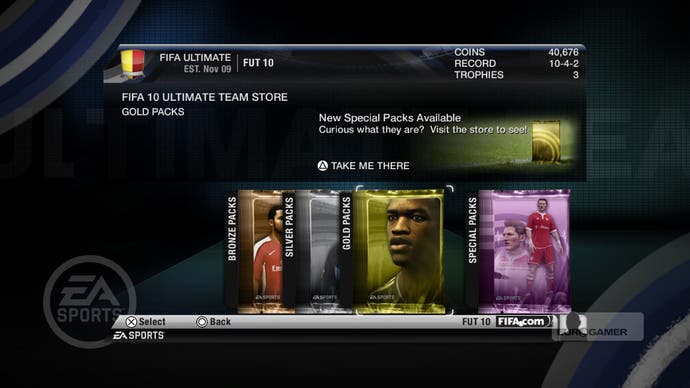FIFA 10: Ultimate Team
You can't win anything with cards.
Perhaps in an effort to level the playing field a little more, the developers have spent a lot of time tinkering with the mode's main tactical off-pitch element, the chemistry system. Players need to take into account their team members' nationalities, leagues and which club they play for. They'll also want to keep an eye on their players' preferred positions and formations. Players obviously perform better if they're playing where they want and with who they want.
However, this time the players are linked with each other, so deciding what formations to use and where to place the players lends a little more weight to the overall chemistry of the team. You'll also need to be aware of how well your squad members will interact with the the team-mates who are placed in close proximity to them. This makes a few positions more crucial in deciding the overall chemistry score; for example, there's not much compatibility required between a striker and a goalkeeper, but a central midfielder needs to be able to 'connect' with up to four other players.
The team's chemistry is also affected by the off-pitch staff. You have the opportunity to sign managers, fitness coaches and physios and it's worth making sure that you keep decent staff cards at your club, because these can tip the balance. Once again, cards have a finite number of games for which they can be used. They can be reactivated with a contract card, and unlike last year's mode, players won't have to discard superstars once they've played their requisite number of games. It's also worth keeping an eye on the menu screen's news banner because if a certain player has a decent week in the real world, their Ultimate Team player card will receive bonuses as a result.

Once you've assembled a squad, you can compete in one-on-one matches or local tournaments against the game's AI, or head online and play in tournaments against human opponents. This year, some of the tournaments have entry criteria, such as a team's star-rating, minimum and maximum amounts of players allowed from the same country, and club affiliation. You are now allowed to create more than one club in this new mode, so you can select from a number of teams to meet each criteria. Also, there is a time limit on some of the tournaments; players have a limited time to enter, and once the deadline's been and gone, some trophies are off-limits for good. In the offline arena, at least in the early stages, Ultimate Team is rather easy, but as you progress to the higher levels of competition you'll find a decent team chemistry becomes more a crucial element.
Alongside the new features and added depth of team management, EA has also decided to strip away a couple of features from last year's model. Game modifiers have been taken out, which lends the whole mode a less arcade-style feel. The sticker book has also been removed, so virtual card collector hounds are out of luck. Strangely enough, EA has placed a cap on player training - it's no longer possible to train a lesser player up to a 99-rated superstar.
It's possible that these changes may irk some of the faithful. But at £3.99, Ultimate Mode is far more reasonably priced than last year's offering. The new chemistry depth offers tons of combinations which can be tried out, and the influx of new content that will become available - such as new packs and new tournaments - is guaranteed to attract anyone who bought this mode last year. EA's decision to profit from micro-transactions may seem a little off-putting, but at least the off-pitch gameplay has been tweaked sufficiently to ensure that a big real-world bank balance isn't the deciding factor for success. In Ultimate Team mode at least, rising to the top of the heap requires more than a blank cheque.

